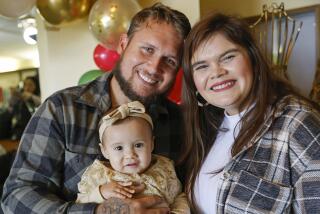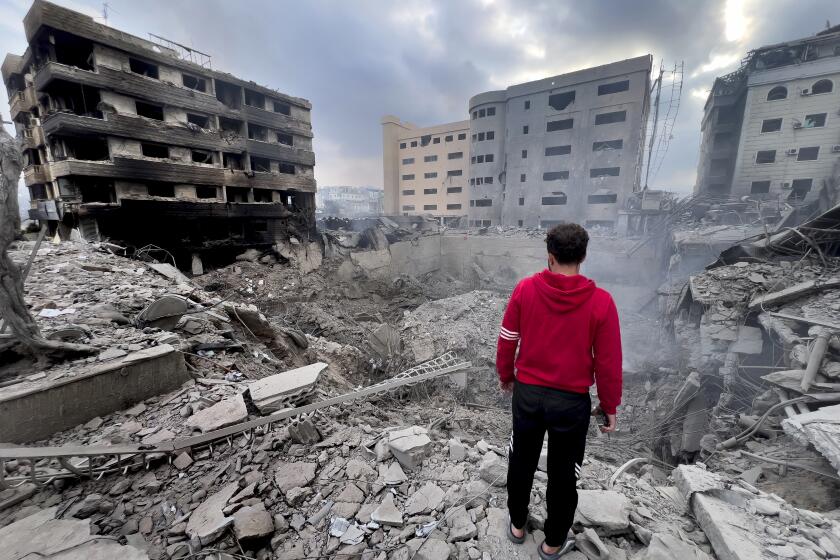Vietnam ‘Moms’ Find Strength Through Many Sons at Virginia Veterans’ Center
Nearly 20 years have passed since their sons’ flag-draped coffins came home aboard a U.S. cargo plane from Vietnam, but for Polly Dixon and Evelyn Barbour, the grieving goes on.
The deaths of their sons brought the two women together in 1969, and together they have found the strength to help the men who survived the troubling war their boys didn’t.
One day a week, they become the “moms” of the city’s Vietnam Veterans Outreach Center, answering telephones, making coffee and sitting in the lobby to talk to anyone who comes in while the counseling group is in session.
“It’s really been a lifeline for me,” Dixon said. “I have a lot of compassion for these guys, and they relate to us because they understand our pain. A lot of them have parents who are dead.”
The women first visited the center three years ago and decided to volunteer. The center, which opened in 1982, is one of 189 nationwide and has served 2,200 Vietnam veterans in its six years.
‘Can Find Some Good’
“I still feel out of everything bad that happens to you, you can find some good if you look for it,” Dixon said. “And I didn’t happen to find any good out of his (her son Roger’s) death until 17 years later, which is the vet center.”
Barbour also credits the center with helping her cope. She said she’ll go to her grave grieving for her son Jimmy, “and if it hadn’t been for this center, I’d probably be there now.”
She has adopted the center’s veterans as her sons, and they call her mom. They have laughed with her, cried with her, put their heads on her shoulder.
“When they say, ‘Mom, it’s rough; he was my brother,’ you feel like it’s a family, and you feel like he’s got to come walking in here soon.”
But the place where they feel closest to their sons is the Vietnam Veterans Memorial in Washington, where they go each Veterans Day.
The first trip to the wall, after it was dedicated six years ago, was overwhelming for Dixon.
Reminded of the Pain
“When you look up there and see all those names,” she said, “all I could think about was all of the pain that all of those parents and wives and families, as well as myself, were still trying to deal with.
“People don’t understand. They think because a boy’s been dead 20 years that you’re supposed to bury him and forget that he existed. You can’t do that. It’s impossible to do that.”
Each time she goes, Dixon leaves a letter for Roger at the base of the wall.
The youngest of Dixon’s three children and her second son to serve in Vietnam, Roger was 19 when he was drafted into the 25th Infantry Division on June 11, 1968.
Forty-four days after his arrival in Tay Ninh, Roger was on patrol. An American platoon mistook Roger’s group for Viet Cong and set off a mine. Roger was hit in the back, the abdomen, both legs and one arm. Four others were killed instantly. He hung on for 8 hours.
Blocks Out That Aspect
At the outreach center, Dixon said: “I don’t talk about the Vietnam part of his life, unless they ask me what happened to him. I talk about the living part of his life,” his love of basketball, his desire to make people laugh.
Jimmy Barbour, the elder of two boys, had always talked about jumping, his mother recalled, but that didn’t lessen her shock when he walked in the door one day and announced that he had joined the paratroopers. He did well, collecting 14 medals and citations that his mother keeps in a wood-and-glass case.
Jimmy was in the service 10 months and 3 days when he caught a bullet in the neck Aug. 27, 1968, while pulling wounded out of the way of enemy fire in Cu Chi northwest of Saigon.
Evelyn Barbour received 14 shock treatments and was in and out of the hospital for 2 1/2 years.
“People wouldn’t believe how close we were, how happy we were,” she said, showing a family portrait of a smiling foursome: Barbour, her Air Force sergeant husband, Jimmy, and her younger son, Wayne.
“Sometimes I’d like to stand on a big mountain and say: ‘Love them.’ It’s so easy to put your arms around them and tell them you love them. But try going and putting flowers on their graves.”
More to Read
Sign up for Essential California
The most important California stories and recommendations in your inbox every morning.
You may occasionally receive promotional content from the Los Angeles Times.










